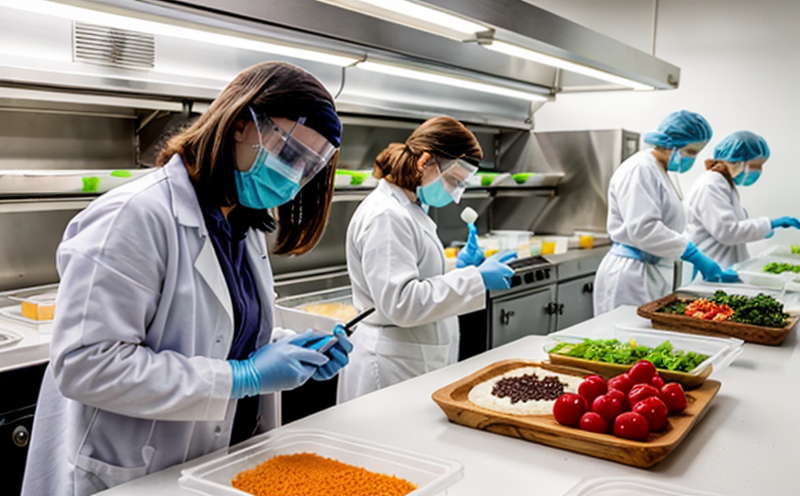ISO 22964 Cronobacter spp. Detection Testing in Food
The presence of Cronobacter spp. in food products, especially those intended for infants and young children, can pose significant health risks due to the virulence of these bacteria. ISO 22964 provides a standardized approach to detecting and quantifying Cronobacter spp. in food samples, ensuring product safety and compliance with international standards.
Our comprehensive testing service adheres strictly to the ISO 22964 protocol, which specifies sampling methods, sample preparation techniques, and analytical procedures for the reliable detection of Cronobacter species. This ensures that your products meet regulatory requirements and consumer safety expectations.
The significance of this standard lies in its ability to provide a consistent methodology across different laboratories, thereby ensuring accurate and reproducible results. Our experts use advanced microbiological techniques including selective enrichment media, colony counting, and PCR-based methods to identify Cronobacter spp. in food samples.
The protocol outlined in ISO 22964 is particularly critical for manufacturers of infant formula, powdered milk, and other products consumed by vulnerable populations. By implementing this standard, companies can ensure that their products are free from harmful bacteria, thereby protecting public health.
Our laboratory follows the strict guidelines provided by ISO 22964 to ensure accurate detection and quantification. This includes thorough sample preparation, careful handling of specimens, and precise execution of testing procedures. Our team of microbiologists is equipped with state-of-the-art facilities and expertise to deliver reliable results.
The process begins with the collection of samples from production lines or storage areas. These samples are then prepared according to ISO 22964 specifications, which involve selective enrichment in media designed specifically for Cronobacter spp., followed by plating on specialized agar plates. Positive colonies are further analyzed using PCR and sequencing techniques.
The use of advanced analytical methods such as PCR ensures high specificity and sensitivity, allowing even low concentrations of Cronobacter spp. to be detected. This comprehensive approach guarantees that no samples slip through the cracks, ensuring product safety at all times.
Our commitment to accuracy and reliability extends beyond mere compliance with ISO standards. We also provide detailed reports outlining our findings, complete with recommendations for improvement if necessary. This proactive approach helps companies maintain a high standard of quality and safety in their products.
| Sampling Method | Sample Preparation | Selective Enrichment Media | Colonial Counting | Analytical Techniques |
|---|---|---|---|---|
| ISO 22964 specified sampling methods. | Thorough preparation as per ISO guidelines. | Selective media for Cronobacter spp. | Plating on specialized agar plates. | PCR and sequencing techniques. |
This detailed approach ensures that our clients receive accurate, reliable, and actionable results. By adhering strictly to ISO 22964, we provide peace of mind for those involved in the production and distribution of food products.
Scope and Methodology
- Sampling: Samples are collected from various points within the production process, including raw materials, intermediate products, and final products.
- Preparation: Samples undergo thorough preparation to ensure they are suitable for analysis. This includes homogenization and dilution where necessary.
- Selective Enrichment: Samples are incubated in media that selectively enhances the growth of Cronobacter spp., making detection easier.
- Colonial Counting: Positive colonies are counted using standardized techniques. This helps quantify the presence of Cronobacter spp.
- Analytical Techniques: PCR and sequencing methods confirm the identity of detected colonies.
The entire process is meticulously documented to ensure traceability and reproducibility. Our laboratory adheres strictly to ISO 22964, ensuring that every step in the detection process meets international standards.
Benefits
The implementation of ISO 22964 Cronobacter spp. Detection Testing brings numerous benefits to food manufacturers and suppliers:
- Compliance: Ensures strict adherence to international standards, mitigating legal risks.
- Quality Assurance: Provides robust quality assurance measures that enhance product reliability and safety.
- Risk Management: Identifies potential hazards early in the production process, allowing for timely corrective actions.
- Consumer Confidence: Builds trust with customers by demonstrating a commitment to product safety.
- Competitive Edge: Differentiates your products in the market through superior quality and compliance.
In an increasingly regulated environment, our service ensures that you stay ahead of regulatory changes and consumer expectations. By integrating ISO 22964 into your testing protocols, you can confidently meet global standards for food safety.
Environmental and Sustainability Contributions
- Eco-friendly Practices: Our laboratory uses minimal resources in the detection process, ensuring that environmental impact is kept to a minimum.
- Waste Minimization: By employing efficient sample preparation methods and selective enrichment techniques, we minimize waste generation.
- Sustainable Equipment: We utilize energy-efficient equipment to reduce our carbon footprint during testing.
- Continuous Improvement: Our team regularly updates its practices based on the latest scientific advancements and environmental regulations.
Our commitment to sustainability is not just a goal but an integral part of our operational philosophy. By adhering to ISO 22964, we contribute positively to both human health and environmental well-being.





